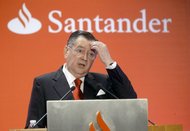 Juan Carlos Hidalgo/European Pressphoto AgencyAlfredo Sáenz helped transform Banco Santander from a regional lender to an international giant.
Juan Carlos Hidalgo/European Pressphoto AgencyAlfredo Sáenz helped transform Banco Santander from a regional lender to an international giant.
8:29 p.m. | Updated
Alfredo Sáenz resigned on Monday as chief executive of Banco Santander, Spain’s largest bank, in a move that ends a period of uncertainty over the bank’s leadership. Mr. Sáenz had been facing a possible ban from banking after a criminal conviction.
Less than a week ago, the bank reported that first-quarter net profit fell 26 percent.
He will be succeeded by Javier Marín, 47, who has worked for Santander for two decades, mainly in its private banking arm, and is the head of its insurance, asset management and private banking operations.
Mr. Sáenz, 70, is departing with a retirement package worth 88 million euros (about $115 million). He was one of Spain’s highest-paid chief executives, earning 8.2 million euros last year despite a pay cut of 29 percent.
Revolving Door
View all posts
Mr. Sáenz joined Santander in 1994 after the bank acquired a local rival, Banesto. Since then, he helped Santander’s chairman, Emilio Botín, 78, transform the company from a regional lender to an international giant.
Yet Mr. Sáenz also faced a series of legal problems, including his conviction in 2009 for making false accusations in the early 1990s in a case involving Banesto. He was pardoned by Spain’s departing Socialist government in 2011, though the country’s supreme court partly overturned that decision this year, renewing concerns over his tenure.
Santander has been hurt by persistent economic problems in Europe, as well as in emerging markets like Brazil. Last year, Santander set aside provisions totaling $25 billion to cover a rise in delinquent mortgages in Spain and an increase in other troubled loans across its businesses.
In Latin America, where Santander earns more than half of its net income, a slowdown in economic growth is starting to cause problems. First-quarter earnings for the region fell 18 percent, to 988 million euros ($1.3 billion), despite an increase in local lending and customer deposits. Profit from Continental Europe in that period plunged 27 percent, to 307 million euros.
Spain’s supreme court ruled in February that the previous government had gone too far in its pardon of Mr. Sáenz. The court reinstated Mr. Sáenz’s criminal record, casting doubt over whether he could continue as a senior executive at Santander.
The current government passed a law this month that allows bankers with criminal convictions to continue working, but that still left Mr. Sáenz exposed to a final ruling by the Bank of Spain. Analysts said the decision by Mr. Sáenz to step down was an attempt to ease the uncertainty.
Even though Santander described Mr. Sáenz’s decision as voluntary, “maybe it was too risky for Santander to be exposed to an inconvenient decision by the Bank of Spain in the next three or four weeks,” said Robert Tornabell, a professor of banking at the Esade business school in Barcelona.
Shares in Santander closed up 2.6 percent on Monday.
Mr. Sáenz’s successor, Mr. Marín, is credited with negotiating several important insurance alliances for Santander, notably with the Swiss company Zurich, covering its Latin American operations, and with Aegon last year.
Still, Mr. Marín’s appointment came as a surprise, given his relatively low profile.
“He would be relatively unknown to the wider investment community, so I guess it may take him a bit of time to establish a rapport with investors,” said Daragh Quinn, banking analyst at Nomura in London.
The appointment also puts Mr. Marín’s name on the list of candidates to succeed Mr. Botín. That list also includes Mr. Botín’s daughter, Ana Patricia Botín, who is in charge of the bank’s British operations.
Professor Tornabell said that Mr. Botín was maneuvering as “in a chess game,” strengthening his leadership during a decline in earnings before probably appointing his daughter as his replacement. Still, Professor Tornabell said that some institutional investors worried that Mr. Botín was running the bank as “a monarchy dynasty,” despite owning only about 2 percent of its equity.
A spokesman for Santander declined to comment. A representative for Mr. Sáenz was not immediately available to comment.
Article source: http://dealbook.nytimes.com/2013/04/29/santanders-chief-executive-resigns/?partner=rss&emc=rss
